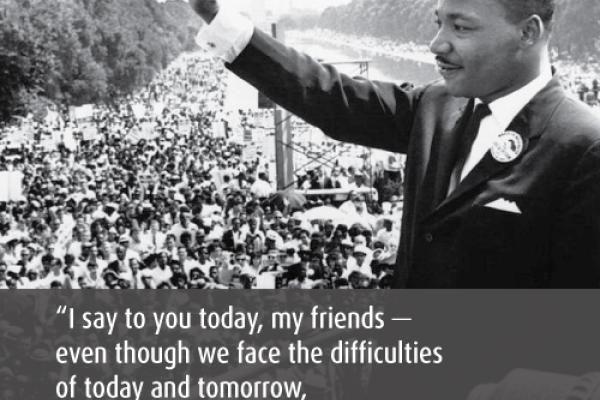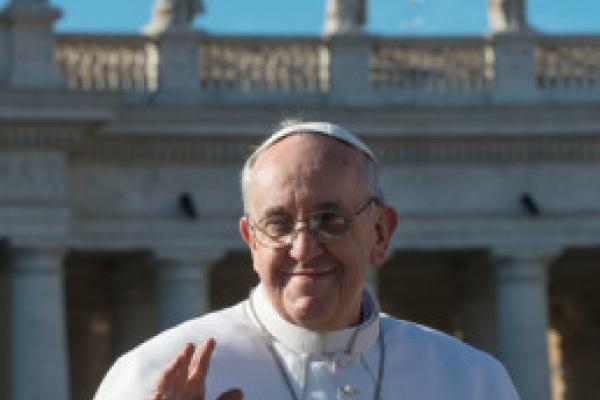Yesterday was the 50th anniversary of a day that changed America, changed the world, and changed my life forever. I was fourteen years old on Aug. 28, 1963, in my very white neighborhood, school, church, and world. But I was watching. The Rev. Dr. Martin Luther King, Jr., became a founding father of this nation on that day, so clearly articulating how this union could become more perfect.
He didn’t say, “I have a complaint.” Instead, he proclaimed (and a proclamation it was in the prophetic biblical tradition), “I have a dream.” There was much to complain about for black Americans, and there is much to complain about today for many in this nation. But King taught us that day our complaints or critiques, or even our dissent will never be the foundation of social movements that change the world — but dreams always will. Just saying what is wrong will never be enough the change the world. You have to lift up a vision of what is right.
The dream was more than the Civil Rights Act and the Voting Rights Act, which both followed in the years after the history-changing 1963 March on Washington for Jobs and Freedom. It finally was about King’s vision for “the beloved community,” drawn right from the heart of his Christian faith and a spiritual foundation for the ancient idea of the common good, which we today need so deeply to restore.
WASHINGTON — Fifty years to the day after Martin Luther King, Jr., knocked on the nation’s conscience with his dream, religious leaders gathered in a historic church to remind the nation that he was fueled by faith.
Later, in the shadow of the Lincoln Memorial where King thundered about America’s unmet promises, King’s children joined the likes of President Barack Obama and Oprah Winfrey to rekindle what Obama called a “coalition of conscience.”
At Shiloh Baptist Church, where King preached three years before his 1963 “I Have A Dream” speech, Christian, Jewish, Muslim, and Sikh clergy summoned King’s prophetic spirit to help reignite the religious fires of the civil rights movement.
King’s daughter, the Rev. Bernice A. King, said at the service that her father was a freedom fighter and a civil rights leader, but his essence was something else.
“He was a pastor,” said King, who was 5 when her father electrified the nation in front of the Lincoln Memorial. “He was a prophet. He was a faith leader.”
Christian conservatives who think Satan is using communism and Islam to bring down America can add a new “adversary” to the list: the Emergent Church movement.
A portion of the upcoming Values Voter Summit in Washington will stray from its usual focus on politics and consider the Emergent Church as one of three “channels the adversary is using to bring America down.” Art Ally, president of The Timothy Plan, a Florida-based mutual fund company devoted to “biblically responsible investing,” will lead the breakout session.
“Why would Satan use Communism? It’s a godless form of government,” said Ally. “Why would Satan use Islam? Same reason. It’s not a religion. It’s a movement to dominate the world under the guise of religion. The Emergent Church plays right into that by weakening further our church community.”
Fearful that Syria might retaliate against Israel if the U.S. launches a military strike, Orthodox Jews and others are demanding the Israeli government distribute gas masks that will fit over their beards.
In recent days, as Orthodox Jews and other bearded men have gone to distribution centers to retrieve their protective hood-like gas masks, they learned the government has only a limited supply, earmarked solely for the elderly and people with breathing problems.
Demand for protective hoods — as well as standard-issue gas masks — has soared since the U.S. administration confirmed that Syrian civilians were killed last week by chemical weapons.
Editor's Note: The following is a transcript of President Barack Obama's speech from the Lincoln Memorial on the 50th Anniversary of the March on Washington.
We rightly and best remember Dr. King’s soaring oratory that day, how he gave mighty voice to the quiet hopes of millions; how he offered a salvation path for oppressed and oppressors alike. His words belong to the ages, possessing a power and prophecy unmatched in our time.
But we would do well to recall that day itself also belonged to those ordinary people whose names never appeared in the history books, never got on TV. Many had gone to segregated schools and sat at segregated lunch counters. They lived in towns where they couldn’t vote and cities where their votes didn’t matter. They were couples in love who couldn’t marry, soldiers who fought for freedom abroad that they found denied to them at home. They had seen loved ones beaten, and children fire-hosed, and they had every reason to lash out in anger, or resign themselves to a bitter fate.
Microsoft CEO Steve Ballmer’s surprise decision to retire does more than throw the technology industry into a frenzy of speculation. It raises the problem of succession.
From major corporations to startups led by visionary leaders, from universities to churches, the departure of the top leader can stop momentum and usher in months, perhaps years, of uncertainty.
Even though dealing with succession is a primary task for a board of directors — some say it’s their preeminent task — relatively few boards take the assignment seriously. They focus instead on the easier work of jousting with the top leader and shilling for institutional investors.
What should be an orderly process of preparing for leadership transition instead becomes a lurching from one standalone regime to the next.
Many board members want the rush of being co-managers of the institution. This is especially true in churches, where boards enjoy making day-to-day decisions about operations. Since a strong central leader would get in their way, many church councils discourage strong clergy and reward compliant permission seekers.
VATICAN CITY — Since mid-July, Pope Francis has been using Communion wafers made by an Argentine prisoner in the daily Mass he celebrates at the Vatican’s Santa Marta residence.
The hosts are made by Gabriela Caballero, a 38-year-old woman who is serving a seven-year jail term in the San Martin Penitentiary outside Buenos Aires.
Her story was revealed by the Argentine news agency NOVA and picked up by Il Sismografo, a blog with close connections to the Vatican.
Caballero gave the hosts, together with a long letter to the pope, to Bishop Oscar Ojea of San Isidro, who regularly visits the prison. Ojea, in turn, delivered the hosts to the pope on July 16 during a visit to the Vatican.
Francis began using the hosts on July 18; the day after he wrote back to Caballero, thanking her for the gift.
As Congress left Washington for August recess, advocates for immigration reform knew it would be a critical month for the effort to fix our broken immigration system. Legislators would be talking with their constituents at countless events about the issue and gauging how public opinion had (or hadn’t) shifted based on the Senate’s recent passage of a bipartisan bill.
Several officials used recess as an excuse for increasing their attacks on immigrants in an attempt to stop the growing momentum across the country for finding a solution to this challenge. For example, Rep. Steve King (R-Iowa) has stated: “For everyone who’s a valedictorian, there’s another 100 out there that weigh 130 pounds and they’ve got calves the size of cantaloupes because they’re hauling 75 pounds of marijuana across the desert.”
Thankfully, other members have been far more constructive. Rep. Spencer Bachus (R-Ala.) embraced immigration reform and the need to provide a path to legalization for the millions of aspiring Americans who are already major contributors to our communities and our economy. He was clear that his motivations were rooted in his religious beliefs, saying: “with my Christian faith, it’s hard for me to say that I’m gonna divide these families up.”







